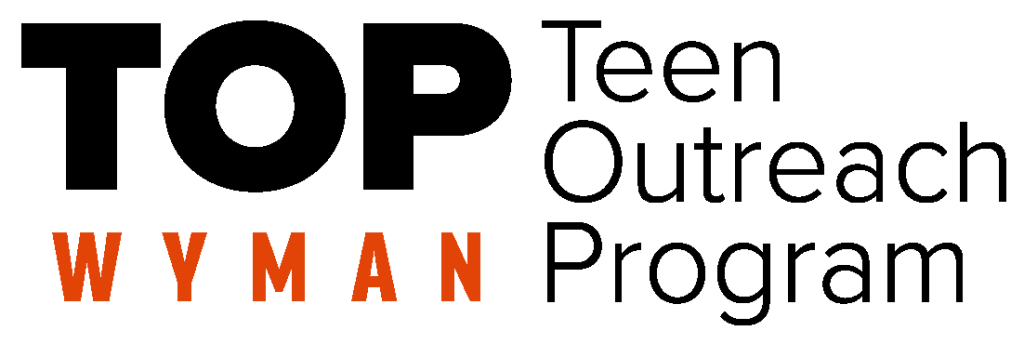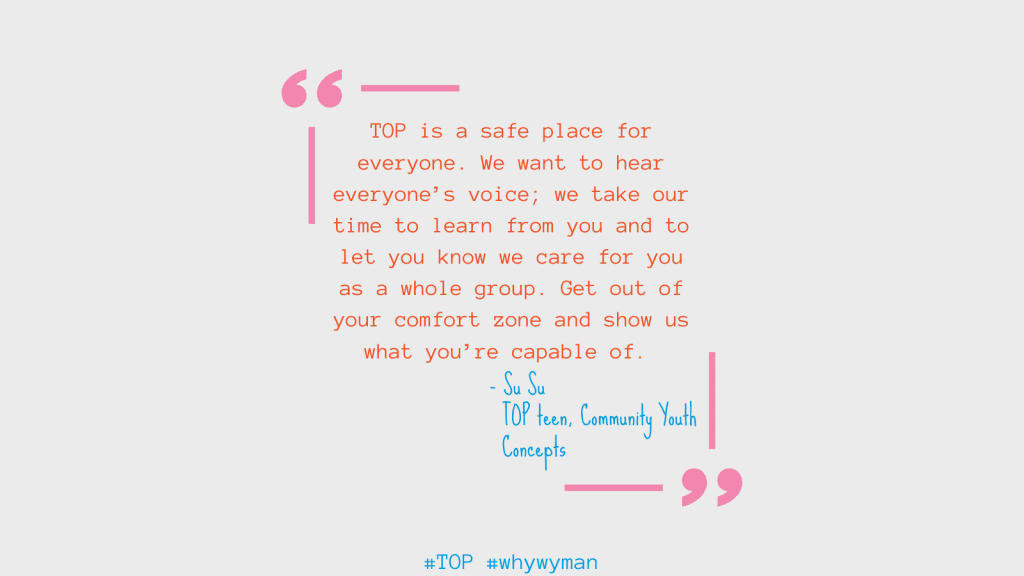

Wyman’s Teen Outreach Program (TOP): Summary of Selected Results
The following summarizes positive outcomes from rigorous research studies conducted on Wyman’s Teen Outreach Program over the last 20 years. Click below each outcome to learn about the studies and results.
Improved Academics
Allen, Philliber, Herrling & Kuperminc (1997)
Type of Evidence: Experimental (RCT)
Study Description: This is a TOP historical study. 695 high school teens in 25 school- and community-based sites across the US were randomly assigned to either receive TOP or regular programming offered by the site.
Outcome Results:
Improved academics: TOP teens showed lower risk of course failure compared to controls.
Decreased risky behavior: TOP teens showed lower risk of school suspension and pregnancy compared to controls.
Reference: Allen, J.P., Philliber, S., Herrling, S., & Kuperminc, G.P. (1997). Preventing teen pregnancy and academic failure: Experimental evaluation of a developmentally based approach. Child Development, 64(4), 729-742.
Allen & Philliber (2001)
Type of Evidence: Quasi-experimental
Study Description: This is a TOP historical study. 1,673 high school teens participating in TOP across the US were compared to 1,604 teens not receiving TOP.
Outcome Results:
Improved academics: TOP teens showed lower risk of course failure compared to controls.
Decreased risky behavior: TOP teens showed lower risk of school suspension and pregnancy compared to controls.
Reference: Allen, J.P. & Philliber, S. (2001). Who benefits most from a broadly targeted intervention program? Differential efficacy across populations in the Teen Outreach Program. Journal of Community Psychology, 29(6), 637-655.
McBride, Chung & Robertson (2016)
Type of Evidence: Quasi-experimental
Study Description: This study was conducted in St. Louis, MO by Washington University researchers. Two demographically similar middle schools were selected to participate as the intervention (TOP) and comparison school. The intervention school implemented TOP in 7th grade. Study included sample of approximately 200 teens.
Outcome Results:
Improved academics: TOP teens were less likely than comparison teens to report failing grades.
Decreased risky behavior: TOP teens were less likely than comparison teens to report skipping classes without permission.
Reference: McBride, A.M., Chung, S., & Robertson, A. (2016). Preventing academic disengagement through a middle school-based social and emotional learning program. Journal of Experiential Education, 39(4), 370-385.
Decreased Risky Behavior
Allen, Philliber, Herrling & Kuperminc (1997)
Type of Evidence: Experimental (RCT)
Study Description: This is a TOP historical study. 695 high school teens in 25 school- and community-based sites across the US were randomly assigned to either receive TOP or regular programming offered by the site.
Outcome Results:
Decreased risky behavior: TOP teens showed lower risk of school suspension and pregnancy compared to controls.
Improved academics: TOP teens showed lower risk of course failure compared to controls.
Reference: Allen, J.P., Philliber, S., Herrling, S., & Kuperminc, G.P. (1997). Preventing teen pregnancy and academic failure: Experimental evaluation of a developmentally based approach. Child Development, 64(4), 729-742.
Allen & Philliber (2001)
Type of Evidence: Quasi-experimental
Study Description: This is a TOP historical study. 1,673 high school teens participating in TOP across the US were compared to 1,604 teens not receiving TOP.
Outcome Results:
Decreased risky behavior: TOP teens showed lower risk of school suspension and pregnancy compared to controls.
Improved academics: TOP teens showed lower risk of course failure compared to controls.
Reference: Allen, J.P. & Philliber, S. (2001). Who benefits most from a broadly targeted intervention program? Differential efficacy across populations in the Teen Outreach Program. Journal of Community Psychology, 29(6), 637-655.
Daley & Buhi (2015)
Type of Evidence: Experimental (RCT)
Study Description: A report of study on TOP implemented by the Florida Department of Health, funded by the Office of Adolescent Health to examine sexual health outcomes. 26 Florida high schools were randomly assigned to either implement the program during the school day or to a control group that did not. This report was based on approximately 4,000 teens from one of two cohorts of study participants.
Outcome Results:
Decreased risky behavior: Compared to teens in the control group, fewer TOP teens engaged in sexual intercourse and fewer TOP teens had ever been pregnant or gotten someone pregnant at program exit.
Reference: Daley, E.M., Buhi, E.R., Wang, W., Singleton, A., Debate, R., Marhefka, S., et al. (2015). Evaluation of Wyman’s Teen Outreach Program in Florida: Final impact report for Florida Department of Health. Findings from the replication of an evidence-based teen pregnancy program.
McBride, Chung & Robertson (2016)
Type of Evidence: Quasi-experimental
Study Description: This study was conducted in St. Louis, MO by Washington University researchers. Two demographically similar middle schools were selected to participate as the intervention (TOP) and comparison school. The intervention school implemented TOP in 7th grade. Study included sample of approximately 200 teens.
Outcome Results:
Decreased risky behavior: TOP teens were less likely than comparison teens to report skipping classes without permission.
Improved academics: TOP teens were less likely than comparison teens to report failing grades.
Reference: McBride, A.M., Chung, S., & Robertson, A. (2016). Preventing academic disengagement through a middle school-based social and emotional learning program. Journal of Experiential Education, 39(4), 370-385.
Walsh-Buhi et al. (2016)
Type of Evidence: Experimental (RCT)
Study Description: A peer reviewed journal article based on the Florida Department of Health and Office of Adolescent Health funded TOP study. 26 Florida high schools were randomly assigned to either implement the program during the school day or to a control group that did not. The sample size for this article was approximately 8,000 teens from two cohorts of study participants.
Outcome Results:
Decreased risky behavior: Compared to teens in the control group, TOP teens were less likely to engage in recent sex and TOP females were less likely to engage in recent risky sex compared to control group females.
Reference: Walsh-Buhi, E.R., Marhefka, S.L., Wang, W., Debate, R., Perrin, K., Singleton, A., Noble, C.A., Rahman, S., Maness, S.B., Mahony, H., Ziemba, R., Malmi, M., Marwah, E., Hall, K., Turner, D., Blunt-Vinti, H., Noble, S., & Daley, E.M. (2016). The impact of the Teen Outreach Program on sexual intentions and behaviors. Journal of Adolescent Health, 59, 283-290.
Daley et al. (2019)
Type of Evidence: Experimental (RCT)
Study Description: A peer reviewed journal article based on the Florida Department of Health and Office of Adolescent Health funded TOP study. 26 Florida high schools were randomly assigned to either implement the program during the school day or to a control group that did not. The sample size for this article includes approximately 4,000 teens from one of two cohorts.
Outcome Results:
Decreased risky behavior: Compared to the control group, teens in TOP were less likely to report recent sex, recent risky sex, and intention to have sex in the next year.
Long-term outcome: At 1 year follow-up, TOP teens were less likely to ever be pregnant or have gotten someone pregnant.
Reference: Daley, E.M., Marhefka, S.L., Wang, W. Noble, C.A., Mahony, H., Arzola, S., Singleton, A., Malmi, M., Ziemba, R., Turner, D., Marwah, E., & Wash-Buhi, E. (2019). Longitudinal evaluation of the Teen Outreach Programme: Impacts of a health promotion programme on risky sexual behaviours. Health Education Journal, 78(8), 916-930.
Long Term Outcomes
Daley et al. (2019)
Type of Evidence: Experimental (RCT)
Study Description: A peer reviewed journal article based on the Florida Department of Health and Office of Adolescent Health funded TOP study. 26 Florida high schools were randomly assigned to either implement the program during the school day or to a control group that did not. The sample size for this article includes approximately 4,000 teens from one of two cohorts.
Outcome Results:
Long-term outcome: At 1 year follow-up, TOP teens were less likely to ever be pregnant or have gotten someone pregnant.
Decreased risky behavior: Compared to the control group, teens in TOP were less likely to report recent sex, recent risky sex, and intention to have sex in the next year.
Reference: Daley, E.M., Marhefka, S.L., Wang, W. Noble, C.A., Mahony, H., Arzola, S., Singleton, A., Malmi, M., Ziemba, R., Turner, D., Marwah, E., & Wash-Buhi, E. (2019). Longitudinal evaluation of the Teen Outreach Programme: Impacts of a health promotion programme on risky sexual behaviours. Health Education Journal, 78(8), 916-930.
Additional Peer Reviewed Articles on TOP
Chung, S. & McBride, A.M. (2015). Social and emotional learning in middle school curricula: A service learning model based on positive youth development. Children and Youth Services Review, 53, 192-200.
- Presents a case study of TOP as an example of a program implemented in middle school that integrates service learning and is built on a positive youth development framework.
Robertson, A.S., McBride, A.M., Chung, S. (2017). Sharing the classroom: A professional development opportunity for teachers and social workers. Power and Education, 9(3), 161-176.
- Explores the strengths and challenges of using interdisciplinary collaboration to deliver TOP in the classroom. The article presents results of three years of qualitative interviews with school administrators, social studies teachers, and TOP Facilitators, as well as student focus groups.
Evidence-Based and Best Practice Listings
Independent research reviews by federal agencies and organizations have recognized TOP for its evidence-base. View the full list of evidence-based recognitions for TOP here.
Learn more about TOP
- Teen Outreach Program
- The Teen Outreach Program (TOP) Blogs are a great place to learn more about this nationally recognized, evidence-based program.


